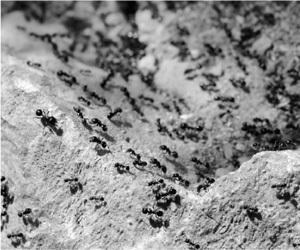Animal BehaviorBehavioral Ecology |
How does social deprivation affect animals? |
The effect of a lack of parental care on the social development of young monkeys was studied by American psychologist Harry Harlow (1905–1981) and his colleagues beginning in the 1950s. In a now classic experiment, Harlow was able to show that the mother-infant bond was so important to young rhesus monkeys that the infants preferred a soft cuddly fake mother to a fake mother built from wire, even if it had a nursing bottle attached. Depending on the age of the monkey and the duration of the treatment (total isolation, isolation with fake mother, and so on), monkeys in these studies later exhibited a range of behavioral deficits, including rocking and swaying, poor maternal behavior, and a failure in understanding communication signals from other monkeys.

Even though each individual ant is far from intelligent, they are all very good at their individually assigned tasks. Thousands of ants in a colony function together as one living organism in a highly efficient system.
